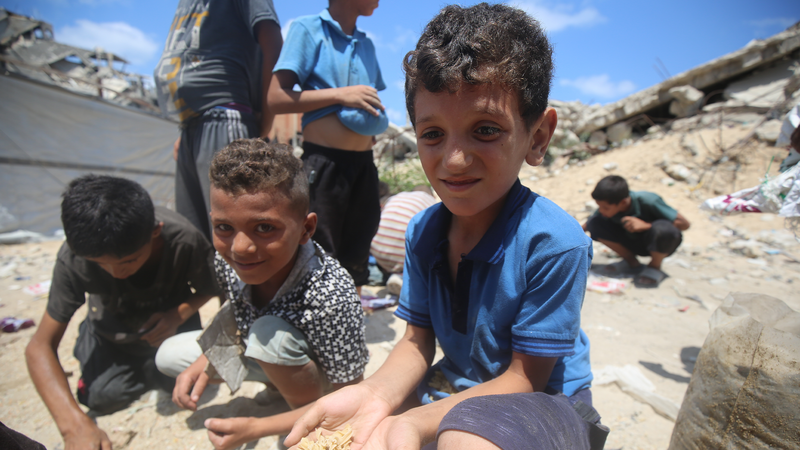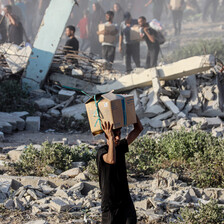The Electronic Intifada 18 September 2025

Boys collect grain that has spilled out of a package from an airdrop north of Gaza City, 7 August 2025.
APA imagesAmer Shallah and his family of 14 were displaced from Shujaiya in Gaza City in October 2023. The family – including his parents, three sisters, five brothers, grandmother and his married sister’s family – now live together in a tent in Deir al-Balah.
Shallah’s father, Ihab, is an employee in the Palestinian Authority, but his salary is nowhere near enough to afford the soaring prices of food.
A kilo of flour that cost less than $1 before the genocide now sells for $20.
Even if Shallah’s father was able to purchase the flour, he would end up paying at least $40 because withdrawing $20 from a bank would incur an additional 38 percent fee.
Shallah, 18, has tried everything to find food for his family, especially his three younger siblings, the youngest of whom, Ahd, is nine.
He has gone to the Gaza Humanitarian Foundation sites, the aid trucks and the airdrops.
On 3 August, Shallah woke up at 8 am, grabbed his backpack – to carry any aid he might secure – and headed to al-Zawayda after hearing that airdrops often occur there.
“I’ve gone three times to the airdrops, trying to get aid,” Shallah told The Electronic Intifada.
Shallah reached the supposed airdrop site – where people usually gather so the planes can recognize the site – at 10 am and stayed until 2 pm, waiting for the aid alongside thousands of others.
Aid planes coming from the north usually fly low as they begin dropping aid packages with parachutes attached.
When the packages fall, people run after them, often having to chase the packages since the wind blows them off course.
The risk of injury or death remains high, as it is not uncommon for a parachute to fail to open, causing the package to spin rapidly as it plummets to the ground.
On this day, when the planes arrived and began dropping packages, Shallah said that one of the aid packages fell extremely fast next to him and, with a huge crash, landed on a wall of a house and destroyed it.
“I might have been killed if I were just a few steps closer to the house,” he said.
Shallah took the first thing he saw in the airdrop and returned to his tent to escape from anyone who might seek to steal the aid.
He got an 800-gram can of chicken meat that would barely feed him, much less his family.
The next day Shallah went again to al-Zawayda – at 10 am this time – and waited.
At 2 pm, the plane flew by, but when the aid was dropped, most of the packages fell far away from the area where he was, landing somewhere near the Nuseirat area. Shallah felt hopeless to chase after them.
A few pallets with aid packages – whose parachutes failed to open – spun rapidly as they fell.
That day, one of the packages crashed onto a tent and killed Odai al-Quraan, a nurse at Al-Aqsa Martyrs Hospital, after ambulances struggled to reach the area, which was jammed with starving people desperate for aid.
“After four hours of waiting for aid,” Shallah said, “I returned to my tent empty-handed.”
Risk of robbery
Shallah went once again to al-Zawayda with his friend Salah Abu Jabal, 18, to chase airdrops on 5 August.
When they arrived, they saw a dozen armed men fighting over the food.
Shallah managed to get five kilograms of rice, one kilogram of salt and a can of strawberry jam.
But Abu Jabal returned to his tent with no aid at all, even though he had managed to obtain a larger package of aid that included sugar, oil and canned beef.
A group of people seized Abu Jabal in al-Zawayda, took him to their tent in Deir al-Balah and robbed him of his aid.
“If Salah didn’t give them the aid, he might have been killed or wounded,” Shallah said, describing the airdrops as “useless.”
Shallah has observed that, at the airdrops he has witnessed, the planes have typically dropped eight or twelve boxes of aid, yet many of them land in areas that are currently under control of the Israeli army.
To keep the airdrops from drifting away, some people – mainly from well-known families in Deir al-Balah – fire at the parachutes to make the pallets with aid fall where people are waiting.
“It is dangerous what people would do just to get food,” Shallah said. “When an airdrop lands very fast because of the shooting, almost all the goods inside were dispersed on the ground. I saw people trying to collect sugar that was spilled on the ground.”
Just as people are gunned down at the Gaza Humanitarian Foundation distribution points, Palestinians in the airdrops areas, Shallah said, are crushed with aid packages and killed.
A knife to Yahya’s neck
Ismail Awadallah Abed, 19, was displaced from Beit Lahiya to Deir al-Balah in October 2023 along with 14 members of his family.
On 5 August, Abed went to the al-Zawayda area with some of his neighbors to try and secure aid.
Abed left his tent at 11:30 am and walked at least two kilometers to reach al-Zawayda, where the airdrops would fall around noon.
He then waited for an hour for the plane to appear in the sky and drop aid packages.
While the area was crowded with thousands of people, Abed only observed six pallets of aid being dropped.
“Thousands of people, including me, returned with nothing,” Abed told The Electronic Intifada.
Some of those who returned with aid were threatened by others.
“My friend Yahya got aid when I was with him,” Abed said. “When he wanted to escape with what he got, a man with a group of people surrounded him and put a knife to Yahya’s neck.”
The men, Abed said, offered Yahya the choice “to either leave the aid or leave his soul” before robbing him.
Abed believes the airdrops are both dangerous and futile – the aid is either stolen, scattered on the ground or simply not enough to meet people’s needs.
Most of the food is spilled on the ground and ruined, he said.
People who go there and risk their lives, he said, do not only return empty-handed but mostly wounded.
“The airdrops are another definition for missiles – both kill innocent people who are being starved to death.”
“Whatever someone managed to get was priceless”
Muhammad Abu al-Meza, 23, an accounting student, has stayed in northern Gaza throughout the genocide.
He has gone to the airdrop sites many times, but he has never returned with anything.
In March 2024, during the famine, Abu al-Meza went to collect aid from airdrops that would fall in al-Suwdania area, in western Gaza City.
Abu al-Meza saw the aid fall into the sea near an area that was under the control of the Israeli military. He was afraid to follow the aid into the sea, but his empty stomach forced him to do so.
“When I got closer to the aid and was about to swim, many people were swimming in front of me and fighting over anything,” Abu al-Meza said.
“Whatever someone managed to get was priceless.”
Abu al-Meza swam after the others until he saw a man drowning. The man couldn’t swim – there was no space in the overcrowded water, packed with people all trying to carry whatever aid they had managed to grab.
“I turned back, paddled as fast as I could and escaped to home,” Abu al-Meza said.
In July 2025, Abu al-Meza and his family were suffering from the famine, so he went again to the airdrops in al-Suwdania, hoping to return with anything.
When Abu al-Meza reached al-Suwdania after two hours of walking, he saw thousands of people just like him waiting for aid.
The situation, he said, was chaotic and “harder than last year.”
He returned home empty-handed – again.
“The airdrops,” Abu al-Meza said, “are useless and extremely dangerous.”
Khaled Al-Qershali is an English graduate working as a journalist in Gaza.





